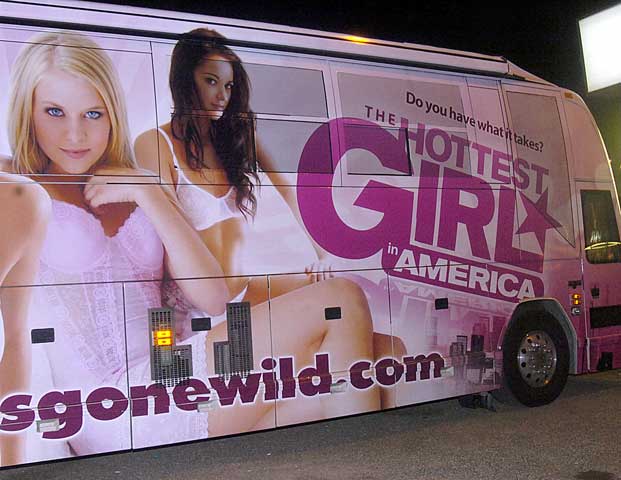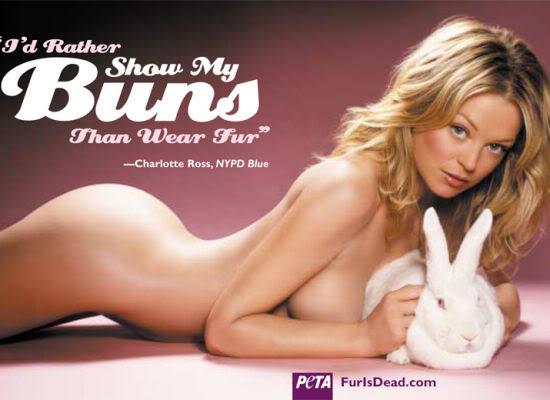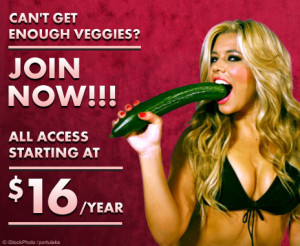By Corey Lee Wrenn, M.S., A.B.D. Ph.D.
Trigger Warning: Discusses pornography and the sexual exploitation of pregnant women.
Not Safe For Work: Contains discussion of pornography and erotic imagery.
Supermodel Marisa Miller, widely regarded as a “sex symbol” for her work with Victoria’s Secret, Sports Illustrated’s swimsuit issues, and Maxim, has posed nude while pregnant for PETA’s SeaWorld ad campaign.
Because the media space is so saturated with sexualized images, pornographers consistently seek to push the edge with more and more taboo or sensational sexualizations.This means that children will be sexualized, grandmothers will be sexualized, pregnant women will be sexualized, etc. This is not to say that children, grandmothers, and pregnant women can’t or don’t feel sexual or enjoy sexual agency–the point is that pornography tries to encroach into spaces where women and girls are traditionally honored and protected from being viewed as a sexual resource to men as a marketing ploy. It is the taboo that sets them apart and sells product. Of course, with, many pornographers taking this route, what was once “taboo” is now accepted and normalized.

PETA also takes a more “traditional” approach in its Seaworld campaign by featuring nude women in public protest who do not appear to be pregnant.
There is definitely a connection between SeaWorld’s imprisoned whales and women in PETA’s ads, but it is not the connection PETA hopes we will decipher: vulnerable demographics are exploited for gain, and this exploitation is seen as entertainment.
We, the viewer, are invited to feel good by consuming, to feel good by gazing at a naked woman and then (maybe) donating to PETA, and to feel good by gazing at a trapped whale and paying admission and buying stuffed Shamus. More importantly, we see it as something the participants “enjoy” doing, and we are discouraged from thinking about the ugliness that lies behind the scenes. In all likelihood, Miller probably did enjoy it, being a supermodel is a career for her. However, we should consider how pornography hurts vulnerable women who do not have the same privilege and access available to wealthy white women. It is important to acknowledge how capitalist framing can obscure the exploitation involved with consumption with imagery of choice, independence, individualism, enjoyment, pleasure, and other good feelings. SeaWorld uses the same rhetoric to justify the imprisonment of their whales: they love what they do. They’re enjoying themselves, so sit back and enjoy the show.
While lacking a feminist critique, Jezebel covers the campaign and admits similar confusion:
A pregnant Miller chilling in a tub makes me think SeaWorld is a place where pregnant Orcas chill in tubs. While that’s by no means a great life for an orca, it’s not exactly the right message.
But maybe the image isn’t meant to be a metaphor at all. Maybe it’s just a continuation of PETA’s long-used tactic of stripping celebrities down as a way of titillating their audience into some kind of low-level version of awareness.
OK, fine. It’s probably that. But it’s still a crappy ad.
Indeed, the level of awareness is quite low. Social psychological research demonstrates that using sex to “sell” ethics backfires. Protest observers actually find the degradation of women to be a serious turn-off. Outside of social movements, research also finds that “sexy” advertising can distract an audience to the point where they don’t even know what was being sold to them.
 Dr. Wrenn is Lecturer of Sociology. She received her Ph.D. in Sociology with Colorado State University in 2016. She received her M.S. in Sociology in 2008 and her B.A. in Political Science in 2005, both from Virginia Tech. She was awarded Exemplary Diversity Scholar, 2016 by the University of Michigan’s National Center for Institutional Diversity. She served as council member with the American Sociological Association’s Animals & Society section (2013-2016) and was elected Chair in 2018. She serves as Book Review Editor to Society & Animals and has contributed to the Human-Animal Studies Images and Cinema blogs for the Animals and Society Institute. She has been published in several peer-reviewed academic journals including the Journal of Gender Studies, Feminist Media Studies, Disability & Society, Food, Culture & Society, and Society & Animals. In July 2013, she founded the Vegan Feminist Network, an academic-activist project engaging intersectional social justice praxis. She is the author of A Rational Approach to Animal Rights: Extensions in Abolitionist Theory (Palgrave MacMillan 2016).
Dr. Wrenn is Lecturer of Sociology. She received her Ph.D. in Sociology with Colorado State University in 2016. She received her M.S. in Sociology in 2008 and her B.A. in Political Science in 2005, both from Virginia Tech. She was awarded Exemplary Diversity Scholar, 2016 by the University of Michigan’s National Center for Institutional Diversity. She served as council member with the American Sociological Association’s Animals & Society section (2013-2016) and was elected Chair in 2018. She serves as Book Review Editor to Society & Animals and has contributed to the Human-Animal Studies Images and Cinema blogs for the Animals and Society Institute. She has been published in several peer-reviewed academic journals including the Journal of Gender Studies, Feminist Media Studies, Disability & Society, Food, Culture & Society, and Society & Animals. In July 2013, she founded the Vegan Feminist Network, an academic-activist project engaging intersectional social justice praxis. She is the author of A Rational Approach to Animal Rights: Extensions in Abolitionist Theory (Palgrave MacMillan 2016).
Receive research updates straight to your inbox by subscribing to my newsletter.
Steak & BJ Day: Because Women’s Cancer is All about Pleasing Men
Not Safe For Work: Contains graphic discussions of sex acts. Website discussed is pornographic.
Content Warning: Intense degradation of women, particularly women disabled with cancer.
On “Steak and BJ Day,” women are encouraged to please the men in their life by cooking them a steak and performing fellatio . . . to “help punch cancer in the face.” You know, because breast cancer, a perfect excuse to serve men.
The event’s corresponding website is a veritable celebration of degradation and male entitlement. The small print is all that distinguishes it from a run-of-the-mill pornography service, but I’m still not convinced. Multiple detailed and graphic instructional essays and videos are available to teach women how to give “the perfect head.” Here’s Step #11 “The Blowing of the Load” from “Blowjob 101”:
Spitting it out means like. Swallowing means love. And gargling with cum makes you look like a crazy slut that probably has STDs. Most guys don’t care about where it goes eventually, but there are some ways to keep it sexy and fun. If he’s into it, he may want to cum on your face. It’s just cum and you trust him. It has to go somewhere and it’s good for your skin. Wherever it goes, wipe it up soon. No one can relax and fall asleep when paste is hardening around them.
Swallow it or wear it if you want to demonstrate perfect servility.
Website visitors can also learn how to cook a steak, purchase merchandise, or pleasure themselves to a gallery of pornographic images of naked women cooking and cleaning for men. Only young, thin, attractive white women, though, all of whom have large, full, and undiseased breasts. Based on the imagery of the website, there are clearly age, weight, racial, and health restrictions to participation in Steak & BJ Day.
Cringing yet? Don’t, because this is actually for a good cause!
In 2015 we’re supporting Coppafeel® – a charity formed to raise boob awareness, fight cancer and save lives. 1.7 million people a year are diagnosed with breast cancer, and who knows how many more are indirectly affected.
You read that correctly. A deadly, painful, miserable disease that disfigures and kills millions of women is really all about saving women’s breasts so men can “cop a feel” and keep the blow jobs and steaks coming.
Beyond the clear pornographic aim of Steak and BJ Day and aside from the atrocious sexualization of a deadly disease for men’s enjoyment, it is also vital to acknowledge clear intersections between the objectification of women’s body parts with the objectification of Nonhuman Animal body parts. The organization’s tag line:
Rumps and Romps. Fillets and Fellatio. Sirloins and Sucking. Best. Day. Ever.
Women’s breasts, mouths, vaginas, and buttocks are put on a plate for men’s pleasurable consumption alongside the slices of lightly cooked and bloodied cow’s flesh. The language used makes the degraded body of the woman indiscernible from the degraded body of the cow. This is all about paying homage to patriarchy. Nothing is sexier in a patriarchal relationship than the humiliation and death of the vulnerable. In this case, the vulnerable could include cows tortured and killed to produce steak, women hurt and humiliated in the performance of androcentric sex acts, and women suffering and dying from breast cancer.
The intersection of these values is especially visible in the below image of a partially nude and sexualized woman covering her breasts with rotting flesh for the male gaze. The pain, vulnerability, humiliation, disease, death, and objectification of vulnerable bodies is considered a turn on.
To those who have loved ones impacted by breast cancer or are struggling with the disease themselves, I can only imagine the humiliation they might feel if they were exposed to this “charity’s” imagery and claimsmaking. Beyond the misogynistic nature of the campaign, the fact that animal flesh consumption is known to be a primary cause of cancer makes this approach not only offensive, but conceptually backwards. Appealing to male privilege to raise awareness for women’s health is also suspect. Historically, women’s diseases have been trivialized or ignored due to patriarchal prioritization of men’s interests. But, again, I do not believe this to be a project with a primary goal of fighting cancer. This is pornography: the sexualization of suffering and subjugation. The cancer variable was likely thrown on superficially as a means to justify this grotesque display of male entitlement. Drawing attention to the fact that women are suffering and vulnerable to death and disfigurement is probably an added bonus: more female pain to fetishize.
 Dr. Wrenn is Lecturer of Sociology. She received her Ph.D. in Sociology with Colorado State University in 2016. She received her M.S. in Sociology in 2008 and her B.A. in Political Science in 2005, both from Virginia Tech. She was awarded Exemplary Diversity Scholar, 2016 by the University of Michigan’s National Center for Institutional Diversity. She served as council member with the American Sociological Association’s Animals & Society section (2013-2016) and was elected Chair in 2018. She serves as Book Review Editor to Society & Animals and has contributed to the Human-Animal Studies Images and Cinema blogs for the Animals and Society Institute. She has been published in several peer-reviewed academic journals including the Journal of Gender Studies, Feminist Media Studies, Disability & Society, Food, Culture & Society, and Society & Animals. In July 2013, she founded the Vegan Feminist Network, an academic-activist project engaging intersectional social justice praxis. She is the author of A Rational Approach to Animal Rights: Extensions in Abolitionist Theory (Palgrave MacMillan 2016).
Dr. Wrenn is Lecturer of Sociology. She received her Ph.D. in Sociology with Colorado State University in 2016. She received her M.S. in Sociology in 2008 and her B.A. in Political Science in 2005, both from Virginia Tech. She was awarded Exemplary Diversity Scholar, 2016 by the University of Michigan’s National Center for Institutional Diversity. She served as council member with the American Sociological Association’s Animals & Society section (2013-2016) and was elected Chair in 2018. She serves as Book Review Editor to Society & Animals and has contributed to the Human-Animal Studies Images and Cinema blogs for the Animals and Society Institute. She has been published in several peer-reviewed academic journals including the Journal of Gender Studies, Feminist Media Studies, Disability & Society, Food, Culture & Society, and Society & Animals. In July 2013, she founded the Vegan Feminist Network, an academic-activist project engaging intersectional social justice praxis. She is the author of A Rational Approach to Animal Rights: Extensions in Abolitionist Theory (Palgrave MacMillan 2016).
Receive research updates straight to your inbox by subscribing to my newsletter.
Vegan Porn is a Barrier to Egalitarianism
A new study in Psychology of Women Quarterly, reports that people who admitted to watching pornography were less likely to support affirmative action for women in a subsequent interview. Why?
“[ . . . ] sexual media activate abstract social scripts, which may then be used to inform opinions about social issues.”
“Pornography often presents women as sexual objects deserving of degradation, and even aggression.”
“In alignment with these depictions, prior studies have found that pornography viewers are more likely to hold a variety of antisocial attitudes towards women.”
Countless studies similar to this one have supported the link between exposure to pornography and a rejection of egalitarian values.
So, my question is: Why does the Nonhuman Animal rights movement (PETA, James McWilliams, CUFA, 269Life, VOKRA, VGirls|VGuys, Animal Liberation Victoria, Vegan Pinup, LUSH, etc.) use porn? How can “sex sell” Nonhuman Animal rights if it fosters anti-egalitarian attitudes? If pornography fosters female objectification and degradation and aggression against women, why would we expect that reaction to magically transform to respect for other animals? And do we not have a duty to protect the safety and dignity of the women who compromise 80% of our movement? How can we build a strong collective if we’re giving the green light to antisocial attitudes against our largest demographic?
This post was originally published on The Academic Abolitionist Vegan on September 16, 2013.
 Dr. Wrenn is Lecturer of Sociology. She received her Ph.D. in Sociology with Colorado State University in 2016. She received her M.S. in Sociology in 2008 and her B.A. in Political Science in 2005, both from Virginia Tech. She was awarded Exemplary Diversity Scholar, 2016 by the University of Michigan’s National Center for Institutional Diversity. She served as council member with the American Sociological Association’s Animals & Society section (2013-2016) and was elected Chair in 2018. She serves as Book Review Editor to Society & Animals and has contributed to the Human-Animal Studies Images and Cinema blogs for the Animals and Society Institute. She has been published in several peer-reviewed academic journals including the Journal of Gender Studies, Feminist Media Studies, Disability & Society, Food, Culture & Society, and Society & Animals. In July 2013, she founded the Vegan Feminist Network, an academic-activist project engaging intersectional social justice praxis. She is the author of A Rational Approach to Animal Rights: Extensions in Abolitionist Theory (Palgrave MacMillan 2016).
Dr. Wrenn is Lecturer of Sociology. She received her Ph.D. in Sociology with Colorado State University in 2016. She received her M.S. in Sociology in 2008 and her B.A. in Political Science in 2005, both from Virginia Tech. She was awarded Exemplary Diversity Scholar, 2016 by the University of Michigan’s National Center for Institutional Diversity. She served as council member with the American Sociological Association’s Animals & Society section (2013-2016) and was elected Chair in 2018. She serves as Book Review Editor to Society & Animals and has contributed to the Human-Animal Studies Images and Cinema blogs for the Animals and Society Institute. She has been published in several peer-reviewed academic journals including the Journal of Gender Studies, Feminist Media Studies, Disability & Society, Food, Culture & Society, and Society & Animals. In July 2013, she founded the Vegan Feminist Network, an academic-activist project engaging intersectional social justice praxis. She is the author of A Rational Approach to Animal Rights: Extensions in Abolitionist Theory (Palgrave MacMillan 2016).
Receive research updates straight to your inbox by subscribing to my newsletter.
An Open Letter to PETA
Dear PETA,
We have such a complicated relationship and history. You were one of my first entry points into animal activism, made me feel not so alone, gave me a sense of connection, and so much passion and hope as a middle schooler. I proudly wore my PETA t-shirts to school, lived on your street team website, and even spent the summer interning with you. I learned how to organize my first protest from you. You provided advice when my teacher wouldn’t allow me dissection alternatives. The “Street Team” forums helped me not feel so weird in the world (although, now I know – weirdness is the best) and gave me the strength to keep going, to keep fighting, even after cruel kids and comments.
So much has changed – and it really, really hurts, to be honest. I know you haven’t changed, and I guess that is the problem. You are still doing what you’re doing – in the way you are doing it. I see your campaigns/advertisements – over the past few years, have reflected back on the media “brainstorming” sessions we had when I was an intern, and it creates these twisted knots in my stomach. It’s really hard to describe the feeling. It’s like when a family member says something really homophobic or sexist, does something that you know isn’t right – but they were the ones who stayed up with you at night as a kid, read you bed time stories, and fought against some of the monsters in your closet. There’s always this soft spot, this hope that they can change, will change.
I’m just. Angry. And sad. Sad for the non-human animals – sad for the animal rights and social justice movements – because it’s a loss, a huge loss, and it’s hurting all of us. We need organizations that are working towards ending ALL forms of oppression – not perpetuating them in the name of justice for one – because it’s not possible. Nothing is a single level issue. And animal rights IS a social justice issue. The non-human animals need everyone.
I struggle when feeling the divide between the social justice/feminist movements and animal rights movements- as though they are separate non-connected issues. And I hate that you are so often the face of the animal rights movement – but you are, so it’s time to hold yourself accountable, take responsibility, and make a change. I beg of you. As that bright and teary fire eyed middle schooler. Please stop with this sexist, racist, non-consent centered bullshit, and please get rid of any remnants related to your latest campaign: “Vegans go all the way.” NO. NO. NO. We need to challenge rape supportive culture, not contribute to it – for non-human animals and human animals.
I don’t really have any more words, but please, I beg of you, on my hands and knees, for all the passionate teens, the cant-quite-fit-in people like me – teach them that we can make a difference, and support them in their multiple identities and experiences, and in ending all forms of violence. Because it’s all connected. Only then can we create a beautifully loving and compassionate world – where violence is not digested. Where sexualized violence is not normalized. Where marginalized non- human animals and human animals are not objectified and seen as inferior.
This goes out to all the feminist movements as well – it’s time to recognize the role violence against non-human animals plays in desensitizing us and normalizing other forms of violence and oppression.
-A once young PETA lover, hoping for change.
By Mary Sue Savage
You can follow her on her blog, Confessions of an Activist with Social Anxiety.
Are You Demanding Respect and Safety or Just Bickering?
Content Warning: Discusses pornography and sexism.
Not Safe for Work: Contains coarse language and sexually explicit subject matter.
PETA posted on Vegan Feminist Network today in response to my article that deconstructs their “Veggie Love Casting” campaign. The campaign depicts young women in bikinis and high heels performing oral sex and other sex acts on vegetables “for the animals.” The statement is reproduced here. I have emphasized the problematic statements and will unpack them below.
The smart, compassionate women who participated in this spot choose to do so because they supported the idea and wanted to take action to help animals. PETA admires them for that and would never tell them that they must behave a certain way in order to gain someone else’s approval. PETA applauds all that everyone does to help animals and attempts to have something to appeal to everyone.
Not everyone agrees with all of PETA’s tactics–and they can choose not to show our videos if they wish–but surely we can all agree that it’s more effective to focus our time and energy on animal abusers rather than bickering with one another.
If you want to learn more about PETA’s other campaigns, or see our ads featuring men, please visit http://www.PETA.org. Thanks again for all you do to promote vegan living and make the world a kinder place for animals.
PETA claims that it did not tell the women to engage these behaviors, but this is a disingenuous justification. Obviously, PETA designed the campaign and hired the participants. This was not a spontaneous grassroots movement to promote vegetable sex for Nonhuman Animals. For that matter, is having sex with cucumbers what women are supposed to do if they want to help animals?
In one way, PETA is correct to say that women are not “told” to engage these behaviors. This is because PETA is normalizing sexist advocacy as female-appropriate advocacy. Female-identified activists increasingly enter the Nonhuman Animal rights movement with an understanding of what is to be expected of them (Gail Dines refers to this socialization phenomenon as “porn ready”). Pornified campaigning is now normalized in the political imagination of the movement. It has become taken for granted as useful, despite social psychological research demonstrating that it is not only ineffective, but also counter-productive.
The tropes embedded in PETA’s response work to protect this normalcy and thus warrant discussion.
1. Choice
“Choice” is a loaded concept that generally works to detract from structural inequality and places responsibility on the individual. It hides privilege and reinforces oppression.
Women “choose” to work in porn because a patriarchal society gives them extremely limited options. Women make this “choice” because they are raised in this society to understand that their worth is tied up in their sexual attractiveness and their sexual availability (unlike men who are taught that they can succeed with strength, leadership, intelligence, wit, etc.).
Most porn actresses come from low income and/or abusive households and have extremely short careers (about 3 years, a time span that has been declining dramatically). The vast majority of porn actresses make very little money. We’re talking about a few hundred bucks for each movie, with a movie deal every few weeks or so. Once they’ve “done it all,” they’re spent, and no longer of use to the industry. Sound familiar? That’s exactly how humans treat layer hens and dairy cows: as expendable sexual resources. Women continue to consent to increasingly degrading, painful, or dangerous sex acts in order to keep in the game as long as possible. The industry exposes women to these precarious and unsafe work conditions with zero job security. If this is the “choice” available to women, something is seriously awry with our labor system.
I’m not blaming these actresses (advocates?) who work for PETA. They’re just doing their job, trying to make a living. Some probably even enjoyed themselves and had fun participating. Instead, I’m blaming the patriarchy that raises women as resources for men. I’m blaming a social movement that is supposed to be about peace but instead exploits women’s vulnerability for fundraising. Under a patriarchy, the rules of the game are rigged to benefit men at the expense of women (and other vulnerable populations, including Nonhuman Animals). All women are products of a patriarchy that grooms them to believe: “Your social worth = Your sex appeal.”
“Choice” relies on a very narrowly defined set of options that patriarchy allows women. If we want to have a serious discussion of “choice,” I suggest we get a straight answer from PETA as to why they intentionally choose women for fundraising and media attention, and why women are disproportionately placed in degrading scenarios, oftentimes (though not in this case) simulating the horrific suffering and death of a Nonhuman Animal by drawing on scripts of violence against women. Like any pornography, PETA campaigns sexualize the humiliation and hurt of women.
2. Appealing to a Wide Audience
The demographics likely attracted to pornography are not likely to be interested in seriously engaging social justice. Pornography further entrenches oppression and reinforces the notion that some persons are objects of resource to other, more privileged persons. Hardly the type of framework we would expect to challenge speciesism. Again, research demonstrates that PETA’s campaigns actually repel viewers who can easily recognize that women are being demeaned.
3. Cricism of Rape Culture as “Bickering”
One in 3 women will be raped, beaten, or otherwise abused at least once in their lifetime. This violence is strongly tied to misogynistic media, and PETA both creates and promotes misogynistic media. To refer to feminist criticism of this systemic violence as bickering is insulting and trivializing. Standing up against the violence that I endure, the violence that millions of women endure, is not bickering, it is social justice in action.
4. Men vs. Women
We do not live in a post-gender/post-feminist society. The bodies of men and women are not viewed or treated similarly. One cannot say, “We use men, too!” with accuracy. It will not negate the misogyny being engaged in the majority of PETA’s outreach. Ninety-six percent of the sexual objectification that occurs in the media depicts women. Women are also many, many times more likely to be victims of rape, sexual abuse, and domestic violence. It is unfair to disregard sexist depictions of women simply because a man’s body is used from time to time.
This argument is particularly nonsensical in PETA’s case. PETA’s advertisements featuring men by and large depict men who are in command over their social space, and their power and status is reinforced. Some of their ads depict men as being silly, Again, there is no serious sexism going on. We find these ads silly because men are so rarely sexually objectified and portrayed in a submissive position. Men are not depicted in sexually submissive positions or as victims of violence, only women are.
Take, for instance, this image of a Bollywood actor advocating for PETA. Notice his confident gaze into the camera, his power over the situation, and his ability to control the space around him and enact change. Notice the posture that depicts confidence.
In contrast, examine this typical PETA ad depicting a naked woman. She is shown in a submissive position, vulnerable, not on her feet, at the mercy of the viewer. Her eyes do not meet the camera directly, but look up from a down turned face. She gently touches the rabbit; there is no command over her space. Her buttocks are raised to denote sexual availability.
The argument that sexism is nonexistent in PETA’s campaigning because nude men are occasionally used as well is a red herring.
We cannot end the objectification of Nonhuman Animals with the objectification of women. We cannot end violence against Nonhuman Animals with violence against women. It’s time to decolonize the activist schema.
 Dr. Wrenn is Lecturer of Sociology. She received her Ph.D. in Sociology with Colorado State University in 2016. She received her M.S. in Sociology in 2008 and her B.A. in Political Science in 2005, both from Virginia Tech. She was awarded Exemplary Diversity Scholar, 2016 by the University of Michigan’s National Center for Institutional Diversity. She served as council member with the American Sociological Association’s Animals & Society section (2013-2016) and was elected Chair in 2018. She serves as Book Review Editor to Society & Animals and has contributed to the Human-Animal Studies Images and Cinema blogs for the Animals and Society Institute. She has been published in several peer-reviewed academic journals including the Journal of Gender Studies, Feminist Media Studies, Disability & Society, Food, Culture & Society, and Society & Animals. In July 2013, she founded the Vegan Feminist Network, an academic-activist project engaging intersectional social justice praxis. She is the author of A Rational Approach to Animal Rights: Extensions in Abolitionist Theory (Palgrave MacMillan 2016).
Dr. Wrenn is Lecturer of Sociology. She received her Ph.D. in Sociology with Colorado State University in 2016. She received her M.S. in Sociology in 2008 and her B.A. in Political Science in 2005, both from Virginia Tech. She was awarded Exemplary Diversity Scholar, 2016 by the University of Michigan’s National Center for Institutional Diversity. She served as council member with the American Sociological Association’s Animals & Society section (2013-2016) and was elected Chair in 2018. She serves as Book Review Editor to Society & Animals and has contributed to the Human-Animal Studies Images and Cinema blogs for the Animals and Society Institute. She has been published in several peer-reviewed academic journals including the Journal of Gender Studies, Feminist Media Studies, Disability & Society, Food, Culture & Society, and Society & Animals. In July 2013, she founded the Vegan Feminist Network, an academic-activist project engaging intersectional social justice praxis. She is the author of A Rational Approach to Animal Rights: Extensions in Abolitionist Theory (Palgrave MacMillan 2016).
Receive research updates straight to your inbox by subscribing to my newsletter.
Male PETA Employees Make Women have Sex with Vegetables “For the Animals”
Not Safe for Work: Discusses pornography and contains sexualized imagery.
Trigger Warning: Discusses pornography
Some may recall that PETA launched a pornography site a few years ago, interweaving graphic scenes of violence with sexualized images of women. Fortunately, it removed the images of women, and the porn site is nothing more than short video clips of factory farms. But that wasn’t the end of the story. The porn is back, now under a new campaign called “Veggie Love Casting Session.”
On the campaign’s website, various clips of women performing sex acts on vegetables are featured. In the television commercial, women are paraded in front of the camera and inspected for the audience like human meat ready for consumption. The project is orchestrated by men who we hear in the background calling the shots, directing the women to show the audience how much they love their assigned vegetable, then laughing at the woman’s humiliation at the end of her session. Photos of the women are listed at the bottom of the page where viewers can rate them with a “thumbs up” or “thumbs down,” adding another level to the women’s objectification.
 PETA even manages to mimic the prevalence of racism in pornography. The only African American woman featured is shown animalized, crawling across the couch to some broccoli where she devours it with no hands.
PETA even manages to mimic the prevalence of racism in pornography. The only African American woman featured is shown animalized, crawling across the couch to some broccoli where she devours it with no hands.
Many would view this campaign and argue that these women are participating “by choice” and they’re “enjoying it.” But this is missing the point. We need to consider what shapes those choices, that being an environment that sees women as sex objects and resources for male enjoyment. Women are under immense pressure to perform the gender roles they have been assigned. Under patriarchy, women are socialized to be servants to men. Women are groomed as little girls, taught that providing sex and pleasure for men is both expected and required of them. Women are given so few opportunities in this world to achieve and succeed based on their skills, knowledge, and other dignifying qualities, sex work is one of the only options available to them. The vast majority of sex work, incidentally, is high risk, low pay work with very little job security and very little agency (most sex workers are pimped or otherwise trafficked). Importantly, this is an option that’s not even on the table for men.
Pornography and other forms of sexual exploitation also target especially vulnerable women, predominantly girls and women from low-income backgrounds or abusive families, girls and women with little occupational or educational opportunities, and girls and women who are suffering from addictions.Pornography hurts all women, but it particularly hurts at-risk women.
After viewing videos of women performing sex acts on vegetables, videos of Nonhuman Animals being beaten and killed automatically pop up on the PETA website. In other words, images of sexualized and humiliated women are juxtaposed with dying animals. PETA is tapping into a new form of sexuality, one that has been popularized by porn culture: subjugating and hurting the vulnerable for the pleasure of the privileged. Seeing someone humiliated and suffering for our enjoyment has become sexy.
PETA is sexualizing the degradation and humiliation of women. PETA is sexualizing the exploitation of vulnerable people. PETA is sexualizing violence against women. PETA is sexualizing oppression.

The director encourages this woman to stuff as many radishes as possible into her mouth to demonstrate to the audience how much girth she can withstand.
The research is overwhelmingly clear: pornography leads to the degradation of women, the objectification of women, the dehumanization of women, and violence against women. It leads women to internalize this devaluation, and women begin to objectify themselves. It disempowers women, it leaves women susceptible to domestic violence, and it feeds rape culture. For more information on how pornography hurts women, check out The Price of Pleasure (warning, the material on the website and in the film are extremely triggering and graphic). I also recommend Gail Dines’ Pornland or Robert Jensen’s Getting Off: Pornography and the End of Masculinity (this book is freely available on his website).
 Dr. Wrenn is Lecturer of Sociology. She received her Ph.D. in Sociology with Colorado State University in 2016. She received her M.S. in Sociology in 2008 and her B.A. in Political Science in 2005, both from Virginia Tech. She was awarded Exemplary Diversity Scholar, 2016 by the University of Michigan’s National Center for Institutional Diversity. She served as council member with the American Sociological Association’s Animals & Society section (2013-2016) and was elected Chair in 2018. She serves as Book Review Editor to Society & Animals and has contributed to the Human-Animal Studies Images and Cinema blogs for the Animals and Society Institute. She has been published in several peer-reviewed academic journals including the Journal of Gender Studies, Feminist Media Studies, Disability & Society, Food, Culture & Society, and Society & Animals. In July 2013, she founded the Vegan Feminist Network, an academic-activist project engaging intersectional social justice praxis. She is the author of A Rational Approach to Animal Rights: Extensions in Abolitionist Theory (Palgrave MacMillan 2016).
Dr. Wrenn is Lecturer of Sociology. She received her Ph.D. in Sociology with Colorado State University in 2016. She received her M.S. in Sociology in 2008 and her B.A. in Political Science in 2005, both from Virginia Tech. She was awarded Exemplary Diversity Scholar, 2016 by the University of Michigan’s National Center for Institutional Diversity. She served as council member with the American Sociological Association’s Animals & Society section (2013-2016) and was elected Chair in 2018. She serves as Book Review Editor to Society & Animals and has contributed to the Human-Animal Studies Images and Cinema blogs for the Animals and Society Institute. She has been published in several peer-reviewed academic journals including the Journal of Gender Studies, Feminist Media Studies, Disability & Society, Food, Culture & Society, and Society & Animals. In July 2013, she founded the Vegan Feminist Network, an academic-activist project engaging intersectional social justice praxis. She is the author of A Rational Approach to Animal Rights: Extensions in Abolitionist Theory (Palgrave MacMillan 2016).
Receive research updates straight to your inbox by subscribing to my newsletter.
















